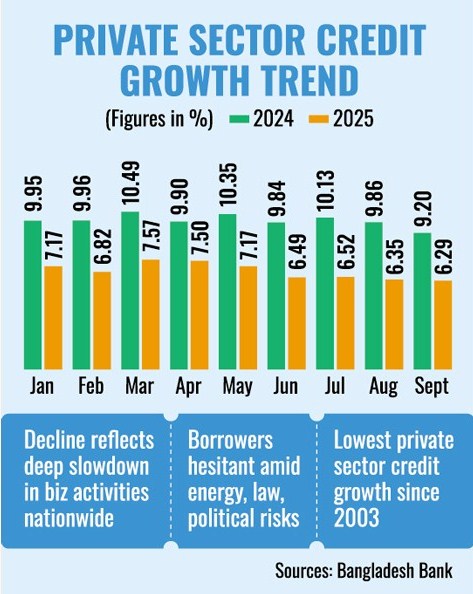Private credit growth hits historic low of 6.29pc in September
ECONOMISTS WARN SLOWDOWN MAY DAMPEN INVESTMENT, GROWTH, JOBS

Published :
Updated :

Formal credit growth for the private sector fell to a historical low of 6.29 per cent in September, signalling a deep slowdown in the country's business activities.
The decline is attributed to banks becoming more cautious amid rising non-performing loans (NPLs) and private borrowers losing their credit appetite due to multiple anti-business factors, including the energy crisis, lawlessness, higher lending costs, exchange rate shocks, and potential political uncertainty ahead of next year's general election.
Data from Bangladesh Bank (BB) on private sector credit growth, available since 2003, shows that credit growth has never dropped this low, even during previous financial shocks.
According to BB, outstanding loans taken by private sector entrepreneurs reached Tk 17.56 trillion by the end of September 2025, up 6.29 per cent from Tk 16.52 trillion a year earlier.

In fact, private sector credit growth has hovered in single digits since August last year, reflecting prolonged sluggishness in the $460 billion economy, which is largely private-sector-led.
Seeking anonymity, a BB official said the central bank continues its contractionary monetary policy stance (MPS), keeping the policy rate at 10 per cent as part of its inflation control measures, despite criticism from business circles.
"The higher lending rate, energy crisis, lack of adequate security in industrial hubs, and potential election-related violence are major reasons behind the plummeting credit demand," the official said.
The official added that the half-yearly MPS projection for private sector credit growth up to December is 7.20 per cent, but the current growth remains below this target. However, growth could pick up in the second half of FY'26, as import orders have shown some recent improvement.
Anwar-ul Alam Chowdhury, president of the Bangladesh Chamber of Industries, said industrial units have struggled to maintain production in recent months due to the energy crisis and security concerns.
He also noted that the recent sharp devaluation of the local currency against the US dollar has severely hampered business operations.
"Increased lending rates have added the final blow. Under such circumstances, who will expand their business? Even running existing operations has become extremely difficult for entrepreneurs," he said.
Syed Mahbubur Rahman, managing director and CEO of Mutual Trust Bank Limited, told The Financial Express that credit demand from the private sector has continued to drop due to the prevailing economic slowdown.
He added that banks are cautious in disbursing funds amid liquidity stress in the later part of the calendar year, as they aim to maintain healthy balance sheets.
Economists view the decline as a negative signal for the economy, warning it could dampen investment, growth, and job creation.
Dr M Masrur Reaz, chairman of the local think-tank Policy Exchange of Bangladesh, said investment growth is slow both in existing operations and in expansion projects.
"Industrial units cannot operate at full capacity due to the energy crisis, exchange rate risks, and high lending rates. As a result, entrepreneurs are reluctant to take credit under current circumstances," he noted.
jubairfe1980@gmail.com


 For all latest news, follow The Financial Express Google News channel.
For all latest news, follow The Financial Express Google News channel.